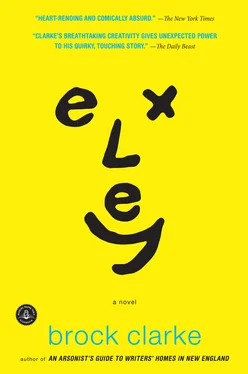“You OK?”
“I’m OK,” I said. My eyes were still closed, but the balloon feeling in my chest was gone.
“You’re going to see the doctor tomorrow, right?”
I told her I was. Right after school.
“All right then,” Mother said. She kissed me on the forehead, then said, with her lips still touching my forehead, “You think too much.” It was like she was talking directly to my brain. Then she stood up. The bed creaked from her getting up off it. “Your head gets you into such trouble, Miller,” she said.
“I know,” I said.
“You cannot let it get you into any more trouble,” she said. This wasn’t advice. This was a demand. Mother was mad now. I wondered if she was this way in court. If she started off calm and talked herself into getting mad. “Do you understand me?”
I told her I did. Then she left the room and closed the door behind her. When she was gone, I opened my eyes. There was a plate on the table next to my bed. On it was a BLT. Mother had made it herself. I knew this because the bread was undertoasted, the bacon overcooked. I didn’t care. I ate it anyway.
AFTER I ATE my birthday sandwich, I felt sleepy. But I didn’t want to go to sleep yet. I was worried that if I tried to go to sleep, all I’d be able to think about was how my dad was in that dark, dark hospital and I hadn’t gone to see him that day. I opened my door and looked into the hall. The door to Mother’s room was closed, and the light was on. She was mumbling in there again. I closed my own door behind me. It didn’t make a sound. Neither did I as I crept downstairs, out the front door, down Thompson and Washington, all the way to the VA hospital.
I’d been wrong about the hospital. It wasn’t totally dark. Or at least it wasn’t after I walked through the door. The revolving doors were locked or frozen. They weren’t revolving. But there was a regular door next to the revolving door. It was locked, too. But there was a red doorbell next to it. I rang it, and there was a buzzing sound. I pulled on the door again, and this time it opened. I walked into the lobby, and the whole place lit up. I just stood there for a second, blinking, trying to get my eyes right. When I did, I saw that the lobby was empty. The woman wasn’t even at her desk, although her computer was on. I could hear it humming behind the desk. I wondered who’d buzzed me in, and while I was wondering this, the lights went out again. I took a step forward, thinking that might activate the lights again, but it didn’t. So I kept walking, in the dark, toward and through the swinging doors.
It wasn’t as dark in the hallway. The overhead lights were off, but there were little rectangular lights on the left side of the floor, where the floor met the wall. The lights were blue, not white or yellow. The place was absolutely quiet. It felt like I was in an aquarium. Even the floor looked wet. I thought it just looked that way because of the lights or something. But when I bent down to touch it, I found out that the floor actually was wet. It was really wet, too. It was like I’d dipped my hand in a sink full of water. I stood up and flicked some of the water off my hand, dried it on my shirt, then walked into my dad’s room.
He wasn’t there. The Dixie cups still weren’t there, either. A Fan’s Notes was on the table. But my dad wasn’t in bed. The bed had been made. The room smelled like it had just been cleaned. I stood there for a while, trying to figure things out. Then the toilet in the bathroom flushed. The door opened and I thought, Holy … But before I could finish the thought, a black guy walked out of the bathroom. He was wearing a janitor’s uniform and was pushing a bucket by the mop sticking out of it. The guy looked tired. He had enormous bags under his eyes. It did look like you could pack something in them. He was too tired, I guess, to be freaked out by me being in the room. When he saw me standing in the doorway, his shoulders slumped in a fatigued way, like he was saying, What now ?
“My dad isn’t here,” I said.
“Apparently not,” the guy said. He pushed the bucket past me and out into the hall.
When he was gone, I sat down in the chair, next to the bed, like I normally did. I took the book off the table. Then I waited. I didn’t know what else to do. I just sat there, waiting for my dad to come back, wondering where he could be. Maybe they’d moved him to the second floor. I liked that idea because that would mean he’d maybe gotten better and could at least talk or something. But if so, why was his book still in the room? Did that mean he’d gone somewhere but was coming back? But where had he gone? Had he gone somewhere so someone could fix him? And what was wrong with him anyway? It was scary having all these questions and no one around to answer them. It was even scarier that there might be someone around to answer them if I could just make myself go and find them and ask the questions. But I couldn’t. I felt like something in my mind was running and running and I couldn’t make it stop.
So I started talking to my dad, even though he wasn’t there. I did this all the time when he was in Iraq. Whenever my mind wouldn’t stop thinking about what he was doing right now, whether he was OK, why he was there in the first place, why I hadn’t heard from him, I’d talk to him, just tell him about my day, and by the end I’d feel a little better, maybe because I could picture him, in Iraq, talking to me the way I was talking to him.
Anyway, that’s what I did in my dad’s empty hospital room: I talked to him, like he was there. I told him about the guy out in front of the Crystal and how he’d hit Harold, and about Mr. D. and the guys in the Crystal and V. and his dad, and about how I’d shot Petey and how it felt bad shooting him the first time and how it felt even worse the second time, because I was so mad I felt like I could keep shooting and shooting and it wouldn’t be my fault, and how I’d never shoot anyone again, because I was pretty sure my dad wouldn’t want me to be the kind of guy who would shoot anyone. But was I right about that? “I’m pretty confused,” I told him. “I wish you were here to tell me what kind of guy you want me to be.” But anyway, I told him that whatever his feelings were about me shooting someone, it was OK if he (my dad) had already done it himself, especially if he’d shot the guy who’d shot him — if someone had shot him, that is. And then I went on and mentioned to my dad how V.’s father and V. knew him and called him a crazy bastard, which I was pretty sure they meant in a good way, and also how V.’s father told me I sounded like Exley, and how K. did, too, even though it didn’t seem to matter that much. “It’s just confusing, Dad,” I told him. “She liked me, but now she doesn’t anymore, I don’t think.” I told him about Mother, how I thought I was hearing her talk at night and how she still wouldn’t admit he’d gone to Iraq and come back. “Otherwise she’s like always,” I said. “I know she misses you.” I didn’t know that, but sometimes when you’re talking to someone who’s not there, you have to lie to him like he was. Especially if you then tell him something true. “I wish you hadn’t left us, Dad. Everything is so messed up now. It’s ten at night and I’m talking to your hospital bed but you’re not in the bed and I need to know where you are. I need to talk to you.”
“Who are you?” someone said from behind me.
“What the.?” I said, and turned around. There was a woman standing in the doorway. She wasn’t Mrs. C., the woman who was usually at the front desk, but she was dressed like her: she was wearing a shirt with cartoon characters, and blue hospital pants and blue hospital clogs, and she was holding a clipboard. “I’m Miller Le Ray,” I said. “I was just talking to my dad.”
Читать дальше












